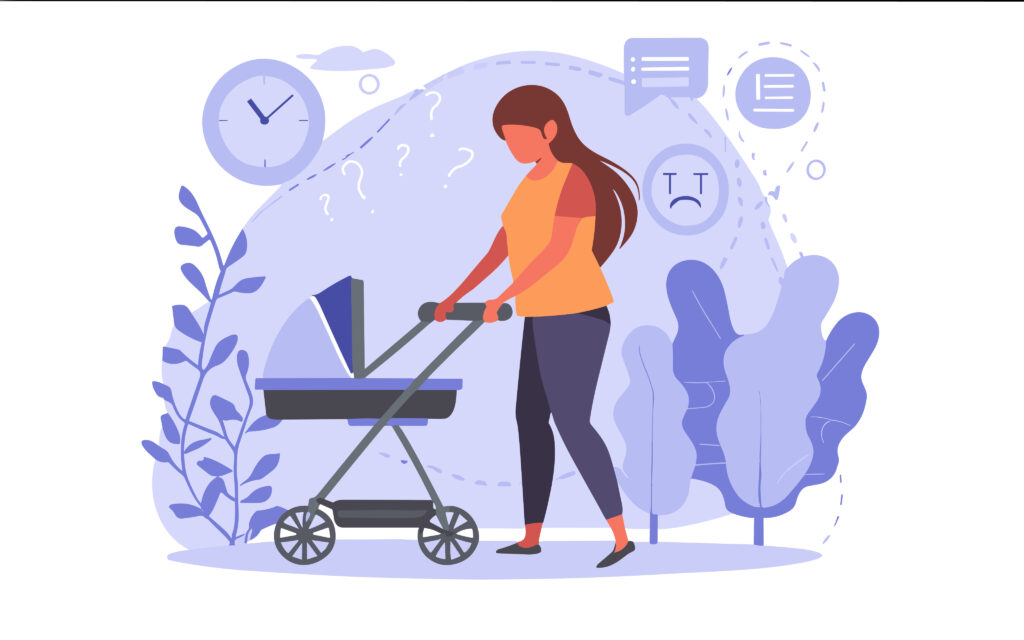A short story of how Postpartum depression felt for me

In the morning, she woke up to a lingering feeling of anxiety in her chest. Like an alarm on her phone, someone had tuned her body so that these feelings grew with each passing minute. Opening her eyes, she lay still for a moment, staring at the ceiling. Her heart pounded, and a lump formed in her throat. Turning her head to the bedside clock, she saw the faintly flickering numbers – 5:30 am. If previously she felt anxiety in specific situations that arose suddenly and randomly, now it came every day, almost to the minute at the same time. Early morning, a time for sleep, but these feelings turned her inside out.
Next to her, blissfully unaware, her husband slept. In the crib beside them, the baby slept peacefully. Just the night before, she chuckled at the baby’s cute snores. Now, at the slightest noise from the crib, panic set in: “Please don’t wake up. Not now. I can’t handle it.”
Summoning the last shreds of strength to avoid waking her husband, she quietly got out of bed and tiptoed to the kitchen. Here tears no longer needed to be held back. The lump in her throat, endless tears, and a heaviness in her chest is like a stone, making it hard to breathe. Anxiety, panic, a swarm of thoughts that she couldn’t handle it, that it was a mistake, that her life would never belong to her again, that she would never feel peace again, and that she was alone. The feeling of loneliness intensified during these episodes, especially when faced with things society doesn’t talk about out loud.
It was frightening to acknowledge this, but she understood why some people take that final step toward the abyss. They want to free themselves from this vicious cycle, get rid of anxiety and pain, and simply can’t see another way out. As an empathetic person, she had always sympathized with those experiencing emotional pain, but she never fully understood what postpartum depression was until now. When she faced it herself, she realized how unbearably painful it could be. She feared thoughts of ending it all, but somewhere in the distance, a faint hope shimmered that the medication would work soon, that therapy would bear fruit, and the pain would subside even a little. Despite the mental anguish, she remembered her life before and wanted to return to it.
Episodes of anxiety happened every morning and often during the day. There was no way for her to stop it, unless she would cry her eyes out. Depression can feel like a real heavy stone placed on one’s chest. It prevents one from sleeping, eating and even inhaling becomes harder. Thoughts are like a black swarm and are sticking one to another giving the person no possibility to realize anything except the overwhelming pressure. The only positive thing about such sobbing is on the biological level human body gets much-needed relief.
On the evening of that same day, when she felt better, she walked with the baby. That day, there was a summer rain, and a pleasant coolness hung in the air. In the park where they usually walked, the scent of wet grass and wood filled the air. The wheels of the stroller rustled as they moved along the path, as is typical after rain. The sky was still covered with dense dark clouds, and she occasionally felt tiny drops on her face. Today, for the first time, she stopped to observe a snail she noticed on the path. It reminded her of childhood when she curiously examined insects, animals, and birds. Of course, this wasn’t healing yet, and, like the snail, she would slowly approach it, but it was pleasant to realize that her depression wasn’t a labyrinth with endless dead ends. She has seen a way out.
It is crucial to find help. Therapy can help unravel many questions and concerns, and antidepressants can make one’s life bearable during the hardest phase of depression. There’s a new generation of antidepressants that a woman can use even if she breastfeeds. Always consult your therapist. There are plenty of stories of postpartum depression that ended tragically. There are still many stigmas around the role of a mother and generally about women. Nevertheless, as the acknowledgment of mental illnesses and their understanding in society rises, so does the capacity and quality of medical help.
Although life would never return to its previous course, and a woman would not return to her former self, over time she will appreciate the new version of herself and accept her new role and life. I did it. It’s a journey that can’t be rushed. Breaks are needed to recharge, to smile at what has been achieved even if it’s just a few steps. The main thing in life is not to quickly reach the goal, but the journey itself and the experiences, feelings, and emotions we encounter along the way. It may sound like a quote from a motivational brochure, but it’s the truth of life. Life is not a computer game where you complete a mission and enjoy the victory, and it’s not a fairy tale where “happily ever after” follows the rescue of the princess. Life is a process, constant metamorphosis, and development, and it’s crucial to understand and accept it, especially if you’re a perfectionist.
Don’t hesitate, seek help! If you can’t do it alone, then let a person of your trust know about your emotional and mental state. Tell them that you need their assistance and support. Each step, even the smallest one, brings you closer to feeling better.
Have you experienced postpartum depression or baby blues? How did you find your way out? Share your story here. Share your experience and maybe it will help others.
If you’re in this dark place right now, I’m sending your way my prayers. You’re not alone and there is a cure.